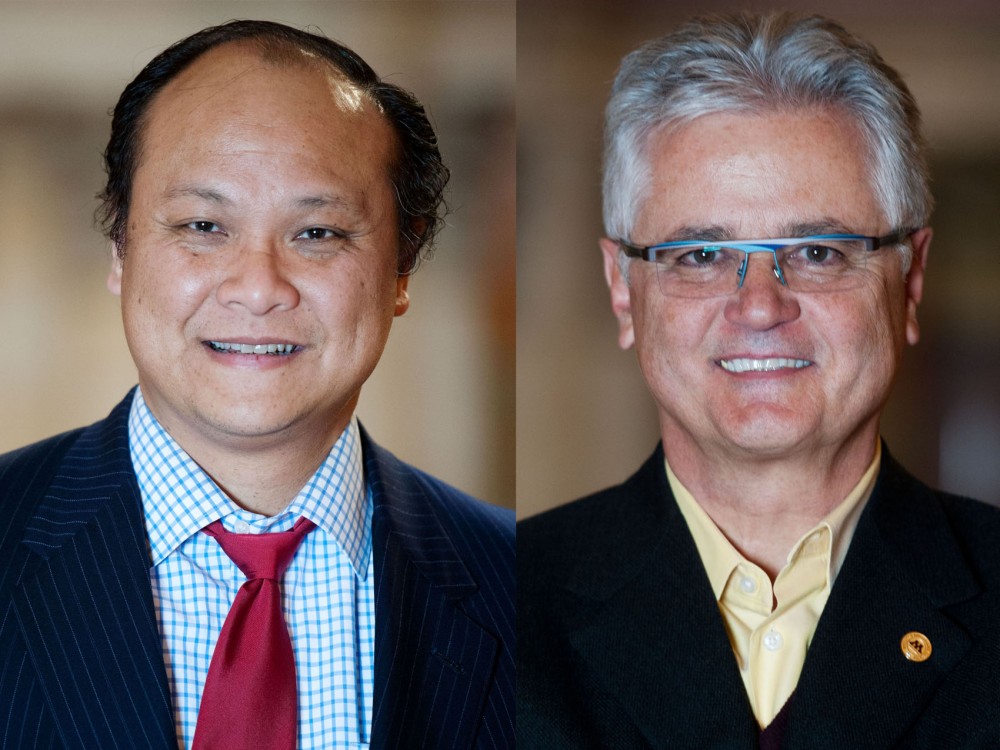Two Minneapolis businessmen are looking to bring their professional experience and backgrounds in education to the University of Minnesota Board of Regents.
Ertugrul Tuzcu and Dennis Nguyen are the finalists vying to represent the state’s 5th congressional district on the board. The two candidates have spent weeks at the Capitol becoming familiar with state lawmakers in an attempt to secure votes.
The regent selected will serve a six-year term on the board, replacing Venora Hung, who was appointed to the board in 2007 while she was a student at the University Law School. The state Legislature will make the appointment later this month.
The Minnesota Daily spoke separately with the two candidates about their goals as potential regents, issues the University needs to address and the unique perspective each thinks he could bring to the board.
Why did you decide to apply for a position on the Board of Regents?
Nguyen: First, I want to leverage my finance background. Second, I want to leverage my international background. The third reason I’m running is because I want to become a role model for historically disenfranchised communities. I’d like to increase access from such communities to the University and find ways for them to financially afford an education at the University of Minnesota.
Tuzcu: I have a passion for education in general, and I’m a huge supporter of the University of Minnesota.
All that I am today is because of the University and the education that I received there, so I feel that everything I have done in my career — professionally and personally — has prepared me for this challenge and opportunity to serve the University of Minnesota at a higher level as a regent. So that’s where I am in my life, and I think it feels good that I can do this, and I am committed to doing it, and I can bring to the table a lot of the experiences and knowledge I have.
What unique perspective would you bring to the Board of Regents?
Nguyen: There’s no one on that 12-member board today that possesses the finance skillset that I have. I’ve spent the last 15 years of my life investing in companies, growing revenues, cutting out inefficiencies in large organizations and cutting costs. Those are exactly the same skills you need right now to sit on that Board of Regents.
Secondly, I would be the only one on that board that possesses on-the-ground, hands-on, global living experience. I was raised in America from the ages of 5 to 24, but I was born in Vietnam, and I’ve spent more than half of my adult life abroad.
Tuzcu: I bring a big business background and understanding and experience. If I’m selected as a regent, I think this background will be helpful as the University of Minnesota has become a large business.
What are some issues you feel the University needs to work on?
Nguyen: We need to grow revenues and find alternative streams of revenues.
Right now we’re depending almost entirely on two different sources of revenue — one is student tuition, and the other is state funding. We’re all aware of the various issues that surround those two sources of funding, so I think we need to go out and engage our corporate partners and maybe look at raising certain tuition fees from our international students as well as our professional students.
These are certain things I’d love to look at as ways to raise additional streams of revenues. In terms of equity, I think we need to increase access as well as provide financial support for people to come to the University, and I think that’s all tied in with raising revenues to the University.
Tuzcu: Of course, the most recent news with the Wall Street Journal article about operational excellence and administrative challenges, so I believe the University’s core mission really needs to be education and research and outreach. It’s been pulled down because of all these administrative challenges and issues that are being talked about. So I think that’s an issue that needs to be resolved once and for all.
Also, the culture at the University needs to evolve to be one of change. As the world is changing, the environment [of the University] needs to be changing as well. We need to look at doing things differently from an operational perspective. So the focus needs to stay on teaching and research. But unless we solve the issues with administrative and operational elements, the focus will only be on that.
I can bring ideas and thoughts as to how to approach that and maybe solve it once and for all.


